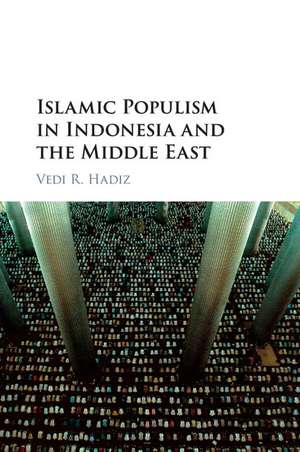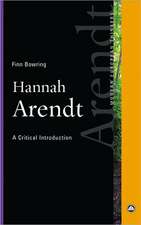Islamic Populism in Indonesia and the Middle East
Autor Vedi R. Hadizen Limba Engleză Paperback – 31 mai 2017
| Toate formatele și edițiile | Preț | Express |
|---|---|---|
| Paperback (1) | 282.48 lei 6-8 săpt. | |
| Cambridge University Press – 31 mai 2017 | 282.48 lei 6-8 săpt. | |
| Hardback (1) | 696.63 lei 6-8 săpt. | |
| Cambridge University Press – 4 feb 2016 | 696.63 lei 6-8 săpt. |
Preț: 282.48 lei
Nou
Puncte Express: 424
Preț estimativ în valută:
54.05€ • 56.58$ • 44.99£
54.05€ • 56.58$ • 44.99£
Carte tipărită la comandă
Livrare economică 31 martie-14 aprilie
Preluare comenzi: 021 569.72.76
Specificații
ISBN-13: 9781107559097
ISBN-10: 110755909X
Pagini: 238
Dimensiuni: 152 x 230 x 13 mm
Greutate: 0.33 kg
Editura: Cambridge University Press
Colecția Cambridge University Press
Locul publicării:New York, United States
ISBN-10: 110755909X
Pagini: 238
Dimensiuni: 152 x 230 x 13 mm
Greutate: 0.33 kg
Editura: Cambridge University Press
Colecția Cambridge University Press
Locul publicării:New York, United States
Cuprins
1. Introduction; 2. Islamic politics and the emergence of a new Islamic populism; 3. The genesis of Islamic populism: historical legacies; 4. Modernisation and the Cold War: paving the way; 5. Pathways of political failure: dissent from the fringe; 6. A study in political marginality: the Indonesian Darul Islam Movement and its heirs; 7. Navigating through democracy: a pathway to power?; 8. Navigating through neoliberalism: a pathway to power?; 9. Conclusion; Bibliography; Index.
Recenzii
'This book is path-breaking in terms of original conceptualization, sustained comparative analysis, and rich historical and sociological contextualization. Grounded in the best traditions of comparative historical sociology, in a deep understanding of global context, and in a solid and sophisticated understanding of Egypt, Indonesia, and Turkey, this book stands as a major contribution to the literature on Islam and politics. It sheds much new light on questions which have remained unanswered or obscured by the narrowness of mainstream social-science methods, analytical frameworks, and political preoccupations.' John Sidel, London School of Economics and Political Science
'Vedi R. Hadiz has long been known as one of the most gifted and courageous analysts of his generation on politics and economics in Indonesia. In his new book, Hadiz turns his attention to the divergent trajectory of Muslim politics in Indonesia relative to the post-Arab spring Middle East. The result is a remarkably original study of Muslim politics and populism. Hadiz grounds the dynamics of Islamic populism in distinctly modern constellations of power and wealth, while also keeping a clear eye on the evolution of Islamic doctrines and ideologies in modern times. This fine work challenges many common culturalist assumptions about modern Muslims. It should be required reading for students of Muslim politics in the Middle East as well as in Indonesia.' Robert Hefner, Boston University
'… this is a bold book with a sometimes startlingly broad scope and a highly original approach … It deserves careful reading by scholars who want to understand Islamic politics in Indonesia, especially by understanding its place in the wider Islamic world. The comparison of Islamic and secular populists, in particular, is a fruitful line of analysis that opens up many new opportunities for comparison …' Edward Aspinall, Journal of Contemporary Asia
'Vedi Hadiz's Islamic Populism in Indonesia and the Middle East manages to challenge the mainstream approach and offers a refreshing way of studying the trajectory of political Islam in Indonesia, Egypt and Turkey in relation to capitalist development. … A critical materialist approach in studying political Islam has been long overdue and Islamic Populism provides a good exemplar for future works in this vein.' Iqra Anugrah, The Jakarta Post
'This comparative study essentially helps to deepen the knowledge of a complex narrative of the new Islamic populism that goes beyond liberal democratic triumphalism and security studies.' Erna Anjarwati, Análise Social
'Vedi R. Hadiz has long been known as one of the most gifted and courageous analysts of his generation on politics and economics in Indonesia. In his new book, Hadiz turns his attention to the divergent trajectory of Muslim politics in Indonesia relative to the post-Arab spring Middle East. The result is a remarkably original study of Muslim politics and populism. Hadiz grounds the dynamics of Islamic populism in distinctly modern constellations of power and wealth, while also keeping a clear eye on the evolution of Islamic doctrines and ideologies in modern times. This fine work challenges many common culturalist assumptions about modern Muslims. It should be required reading for students of Muslim politics in the Middle East as well as in Indonesia.' Robert Hefner, Boston University
'… this is a bold book with a sometimes startlingly broad scope and a highly original approach … It deserves careful reading by scholars who want to understand Islamic politics in Indonesia, especially by understanding its place in the wider Islamic world. The comparison of Islamic and secular populists, in particular, is a fruitful line of analysis that opens up many new opportunities for comparison …' Edward Aspinall, Journal of Contemporary Asia
'Vedi Hadiz's Islamic Populism in Indonesia and the Middle East manages to challenge the mainstream approach and offers a refreshing way of studying the trajectory of political Islam in Indonesia, Egypt and Turkey in relation to capitalist development. … A critical materialist approach in studying political Islam has been long overdue and Islamic Populism provides a good exemplar for future works in this vein.' Iqra Anugrah, The Jakarta Post
'This comparative study essentially helps to deepen the knowledge of a complex narrative of the new Islamic populism that goes beyond liberal democratic triumphalism and security studies.' Erna Anjarwati, Análise Social
Notă biografică
Descriere
This book compares the evolution of Islamic populism in Indonesia and the Middle East to shed new light on contemporary Islamic politics.













